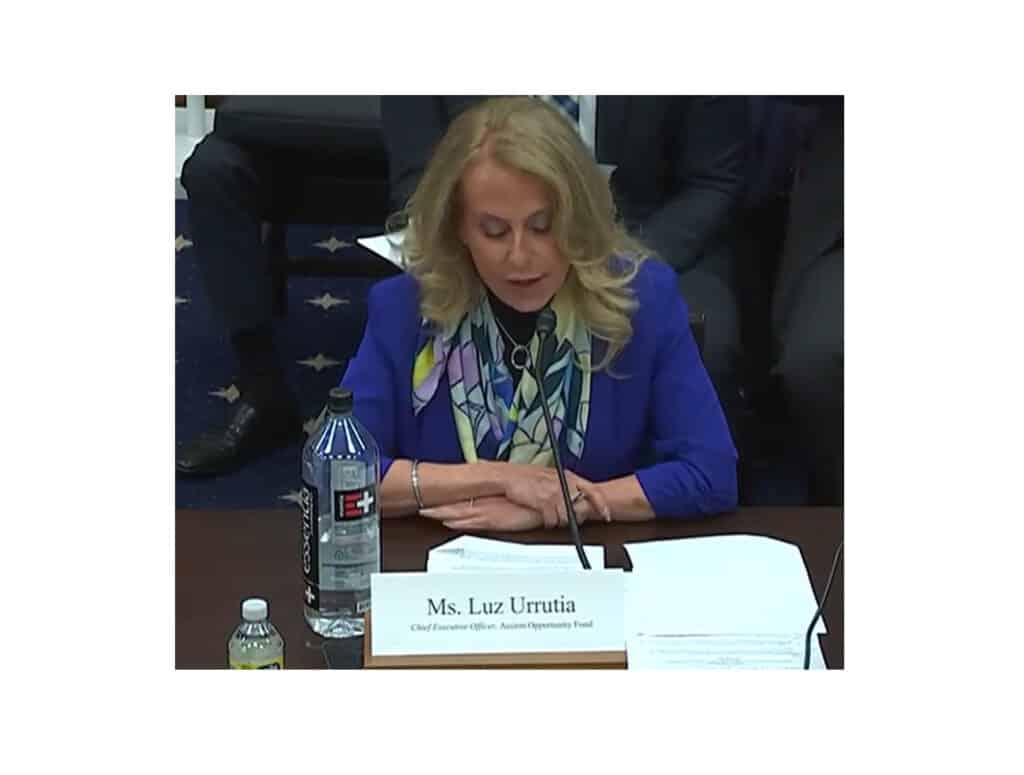CEO Luz Urrutia’s Congressional Testimony on Lending Transparency
On March 28th, 2023, Accion Opportunity Fund CEO Luz Urrutia delivered this testimony to the U.S. House Subcommittee on Economic Growth, Tax, and Capital Access—a subcommittee of the House Small Business Committee. Luz spoke to the importance of Section 1071 of the Dodd-Frank Act, which addresses how financial institutions compile and submit data on loans to small businesses, businesses owned by people of color, and women-owned businesses.

Good morning, Chairman Meuser, Ranking Member Landsman, and Members of the Committee.
Thank you for the opportunity to testify and discuss the CFPB’s Small Business Lending Data Collection Rule, Section 1071. My name is Luz Urrutia, and I am the CEO of Accion Opportunity Fund (AOF), one of the nation’s leading non-profit Community Development Financial Institutions (CDFI) providing access to loans, business advising and networks to underinvested entrepreneurs.
I spent my entire career in for-profit financial services, which included nearly two decades at Wachovia Bank, then as the co-founder and CEO of a community bank in Atlanta, and as CEO of a payday lending company where I helped to ensure that they provide responsible financing to their customers. I joined AOF as its CEO because of my experience as a lifelong for-profit banker and my passion for providing responsible financial services to underinvested communities. I know for a fact that business and lenders can generate profit and do the right thing investing in all communities.
Accion Opportunity Fund’s Impact
As CEO, I am very proud of the impactful work AOF has done to provide capital to entrepreneurs that are often left behind by our financial system. To date, we have deployed over $700 million to over 25,000 entrepreneurs and 80% of our borrowers are entrepreneurs of color, women and/or immigrants. In fact, women make up one out of every three clients we serve.
It is because of the entrepreneurs we serve that I have advocated for rules like Section 1071, which will allow our entire financial services system to fully see and better serve all of our entrepreneurs.
Entrepreneurs who need to be seen by the financial system
And this transparency is not just about fairness. It is also about strengthening our economy. A recent study shows that minority- and women-owned small businesses employ nearly 20 million people and generate over $2 trillion in revenue.
I know this to be true, personally as the CEO of AOF, because I think about clients such as Reign Free from Oakland, who started and scaled her catering business after repeatedly being told that she did not qualify for a loan. We were her first lender to say yes. I also think about Alicia [Villanueva] from Hayward, who took the $5,000 loan we gave her, purchased a van and now she has a burgeoning tamales business nationwide.
I’m proud that we provide loans to everyone—Black, White, Latino, Asian and low-income. But I am especially proud of our investment in Black and Latina women who are starting up more businesses in [the] U.S. than any other group. I am proud that AOF supports these entrepreneurs, and the businesses that they found, the local employees they train and hire, and the economic activity they generate.
About Section 1071
However, for decades, entrepreneurs like these women have not been seen by our financial system. While I am not here to defend or promote every letter of Section 1071, I recognize that this rule will accomplish three important things: it will help small business lenders, help entrepreneurs that desperately need access to capital, and help policymakers that want to invest in our economy without creating new direct entitlement programs.
First, this rule could help the market to better address both the lack of access to affordable capital, and the rise of irresponsible lending. For the first time, everyone in financial services would be able to see which business models are successful at reaching minority-owned, women-owned and other small businesses. This transparency would attract investment capital and partnerships into models that work. We can have a market-based and pro-innovation approach to regulation, one that will actually help lenders expand customer acquisition—something that all community banks and lenders desperately want to do. But we need clarity on who the businesses are, who’s serving them, and what capital they’re getting. Because WE CANNOT MANAGE WHAT WE DO NOT MEASURE.
Second, as lenders, the better we understand these businesses, it will help us tailor products and services to meet their needs. The more knowledge we gain about our markets, customers and their needs, the better equipped we are to building long-term profitable relationships.
Finally, this rule helps spur additional investments in small businesses, which is the best way to reduce inequities without having to create new government programs. Instead, it will allow all of us to do what our organizations have successfully done for years—expand access to capital for underinvested entrepreneurs by leveraging existing public and private sector partnerships.
For these reasons, I am pleased to testify on how we can ensure that Section 1071 accomplishes its goals of spurring additional investment in all of our entrepreneurs. I will conclude by saying that access to capital for small businesses is a bipartisan priority. There are Mom and Pop stores in communities that are rural and urban; red and blue; Black and White, Hispanic, and Asian—and they are all powering our economy. But we cannot do that without Section 1071 to shine light on these small businesses’ credit applications.
Because as I said before—we cannot manage what we do not measure, and sunlight is the best disinfectant. As we implement this well, we will finally be able to increase access to capital for small businesses and create a more transparent and successful financial services system. Thank you and I look forward to your questions.
Browse our resources to see more of our involvement in congress, tap into our business Coaching Hub or apply for a loan with AOF now.